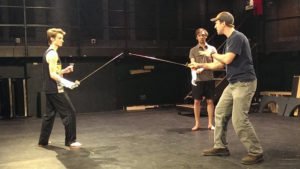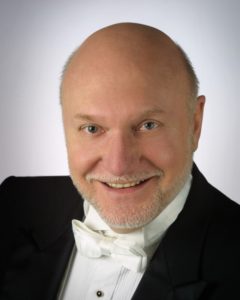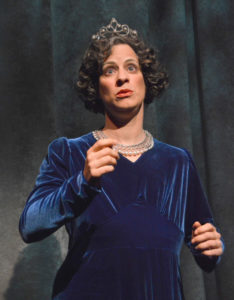by Aaron Preusse (Stage Combat Choreographer for The Three Musketeers)
 “All for One and One for All!” is an iconic line that brings to mind images of swashbuckling Musketeers banding together to beat impossible odds. This classic phrase and its ideal is also, I believe, the foundation for stage combat.
“All for One and One for All!” is an iconic line that brings to mind images of swashbuckling Musketeers banding together to beat impossible odds. This classic phrase and its ideal is also, I believe, the foundation for stage combat.
Keeping someone safe while trying to kill them is a bit like rubbing your stomach while patting your head—it’s easy to do only after lots of practice. It’s this paradox of partnering safely while trying to commit acts of violence that I have come to call a “Contest of Generosity.” As a character, I might be trying to stab you through the heart but as the actor, I am doing everything I can to keep you safe and have it “appear” as though I am threatening your life. It’s this working together and abiding by the safety mechanisms which allows the actors to explore their character’s intentions fully, while at the same time delving into a relationship of trust and compassion with their scene partner quickly forming a tight bond with each other.
 Some of my best friends have come from “crossing swords” with them and the relationship that is formed in that process. This connection is not unique to me, it is found any time you have two or more individuals collaborating together while giving everything they have to their partners. It is why theatre is such a wonderful art form. Theatre is the collaboration of actors, designers, directors, playwrights and the audience and the connection that ensues when telling and receiving the story. Stage combat has that same collaboration, you just happen to be doing it with weapons.
Some of my best friends have come from “crossing swords” with them and the relationship that is formed in that process. This connection is not unique to me, it is found any time you have two or more individuals collaborating together while giving everything they have to their partners. It is why theatre is such a wonderful art form. Theatre is the collaboration of actors, designers, directors, playwrights and the audience and the connection that ensues when telling and receiving the story. Stage combat has that same collaboration, you just happen to be doing it with weapons.
It’s an amazing thing that happens when you put a sword into someone’s hand, they instantly want to play, where they can be Zorro or Luke or…one of the Three Musketeers. There is a sense of power that comes from stage combat, not the power that you might think; instead it’s the power of connection, trust and generosity. This comes from a commitment to make your partner look good, to give them what they need and in turn receiving the same. It is through this play, commitment and camaraderie that you have a scene that is safe, believable and exciting. This reliance on each other cuts to the heart of what is needed and creates an honest visceral moment. In that connection you build trust in each other and in yourself and there forms the alliance. “All for One and One for All” becomes a contest of generosity. Not a bad way to live your life!









 I’ve often thought that some things that Drumpf says at rallies would be considered somewhat typical, though edgy, entertainment if uttered on Saturday Night Live. In that context, many people wouldn’t give them a second thought. But hearing them from someone running for the most powerful position in the world is a new phenomenon in my lifetime. Maybe I’m deluding myself, but I don’t remember hearing such over-the-top insults—usually reserved for stand-up comedy—in a presidential campaign before. That’s probably why he’s generated so much passionate attention from both supporters and opponents alike.
I’ve often thought that some things that Drumpf says at rallies would be considered somewhat typical, though edgy, entertainment if uttered on Saturday Night Live. In that context, many people wouldn’t give them a second thought. But hearing them from someone running for the most powerful position in the world is a new phenomenon in my lifetime. Maybe I’m deluding myself, but I don’t remember hearing such over-the-top insults—usually reserved for stand-up comedy—in a presidential campaign before. That’s probably why he’s generated so much passionate attention from both supporters and opponents alike. When watching a political campaign, though, I look for the candidate whose words and deeds I can trust the most. It’s a bit different than belief—I might believe a candidate’s promises just because I want to hear them, but can I trust them, too? If elected, his or her actions and words will have consequences in the real world, not just a storytelling world of suspended disbelief.
When watching a political campaign, though, I look for the candidate whose words and deeds I can trust the most. It’s a bit different than belief—I might believe a candidate’s promises just because I want to hear them, but can I trust them, too? If elected, his or her actions and words will have consequences in the real world, not just a storytelling world of suspended disbelief.


